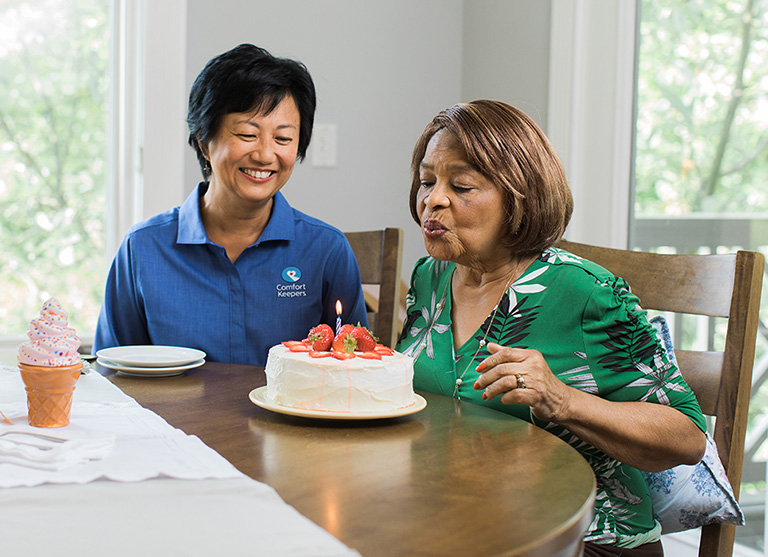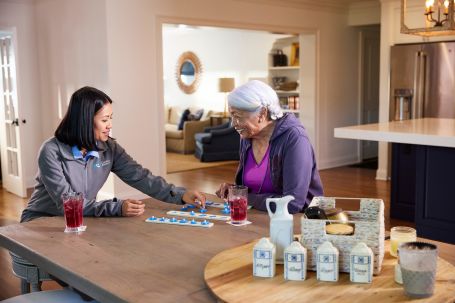Welcome to Comfort Keepers In-Home Care in Monroe Township, NJ


 |
 |
 |
As our senior loved ones age, ensuring they receive the care and support they need to live a comfortable and fulfilling life becomes increasingly important.
Home care has become the preferred option for families in Monroe, NJ, for their senior loved ones. Home care allows seniors to remain in the familiar surroundings of their own homes while receiving the assistance they require.
Understanding the Importance of Compassionate Home Care
Our cherished senior's general well-being is greatly impacted by compassionate in-home care. It offers them emotional support, company, and a sense of belonging to a community, in addition to taking care of their physical needs.
Seniors' freedom is maintained, and their general quality of life is improved when they receive compassionate care in the convenience of their own homes.
The encouragement of social engagement is one of the main advantages of compassionate home care. Many seniors in Monroe, NJ, could feel lonely and alone, which could harm their mental and emotional health.
Seniors with a caregiver who sincerely cares for them might develop deep relationships and
enjoy social interaction inside and outside their homes.
What Are the Benefits of Home Care for Seniors in Monroe, NJ?
Home care has many advantages for seniors in Monroe, NJ. First of all, it enables them to keep their independence and remain in their comfortable surroundings.
Being able to stay at home offers comfort and security because aging frequently results in a sense of loss of independence and change.
Additionally, home care services can be tailored to meet each individual's specific needs, ensuring that they receive personalized attention and assistance.
Receiving personalized attention is yet another big benefit of home care. Staff members at a facility or nursing home frequently handle various tasks and may require assistance to give seniors the personalized care they deserve.
A greater connection and support can be achieved when seniors get care at home since they have their caregiver's undivided attention around the clock.
Types of Services Provided by Comfort Keepers
Comfort Keepers is a leading provider of home care services for seniors in Monroe, NJ. They offer a wide range of services to meet the unique needs of each individual.
These services include assistance with daily activities such as:
Bathing
Dressing
Meal preparation
Transportation to appointments
Comfort Keepers also provides companionship, ensuring seniors have someone to talk to and engage in activities with.
In addition to personal care services, Comfort Keepers offers specialized care for seniors with specific conditions such as dementia or Alzheimer's.
Our caregivers are trained to provide the necessary support and create a safe and comfortable environment for seniors with memory loss.
Seniors and their loved ones, regardless of age or ability, benefit from this specialized care by having a higher quality of life.
The Role of Caregivers in Providing Compassionate Home Care
Monroe, NJ, seniors need compassionate home care, which caregivers provide. They are in charge of helping with daily tasks and developing a close, dependable bond with their clients.
Seniors are made to feel cherished and cared for by the emotional support and company provided by our in-home caregivers.
Our caregivers not only attend to the physical and emotional requirements of their seniors, but they also act as health advocates for them. They communicate with other important parties, including family members, close friends, and medical specialists, to guarantee that the finest in-home care is given.
Our in-home caregivers are qualified to spot changes in the health or well-being of their seniors and take the necessary steps to address any issues before they become life-threatening.
Job Opportunities in Senior Care in Monroe, NJ
Consider working as a caregiver with Comfort Keepers in Monroe, NJ, if you love to help others and are looking for a fulfilling profession. Several senior home care industry job options let you make a difference in the lives of seniors in your neighborhood.
Compassionate and committed people are needed to enter the caregiving field as the demand for home care services keeps rising.
Caregiving jobs in Monroe, NJ, provide a fulfilling career path with personal and professional growth opportunities.
Whether you are starting your career or looking for a change, becoming a caregiver with Comfort Keepers allows you to make a meaningful difference in the lives of seniors and their families.

How to Become a Caregiver for Comfort Keepers
Suppose you are interested in becoming a caregiver for Comfort Keepers and live in Monroe Township, East Brunswick, Old Bridge, Englishtown, or the surrounding areas. In that case, there are several steps you can take to pursue this rewarding career.
First, research the requirements and qualifications needed to become a caregiver in your state. These may include completing a training program, obtaining certifications, and passing a background check.
Once you have met the requirements, contact Comfort Keepers to learn more about available caregiver positions in Monroe.
The hiring process may involve:
Phone screenings and in-person interviews
Reference and background checks
Additional training, including specialized Alzheimer's and dementia care
It is essential to demonstrate your commitment to providing compassionate care and your ability to connect with seniors on a personal level.
Providing Compassionate Home Care for Elderly Loved Ones in Monroe, NJ
At Comfort Keepers, we understand that providing compassionate home care for elderly loved ones in Monroe, NJ, is essential for their overall well-being and quality of life.
Home care allows seniors to stay in familiar surroundings while receiving personalized assistance and support.
Comfort Keepers offers a wide range of services to meet the unique needs of each individual, ensuring that seniors receive the care they deserve.
If you have an elderly loved one in Monroe Township, East Brunswick, Old Bridge, Englishtown, or the surrounding areas, consider contacting Comfort Keepers to explore available in-home care options.
Our compassionate caregivers are dedicated to enhancing the lives of seniors and providing them with the support and companionship they need.
Take the first step towards ensuring the well-being of your senior loved one by contacting Comfort Keepers of Monroe today.



















